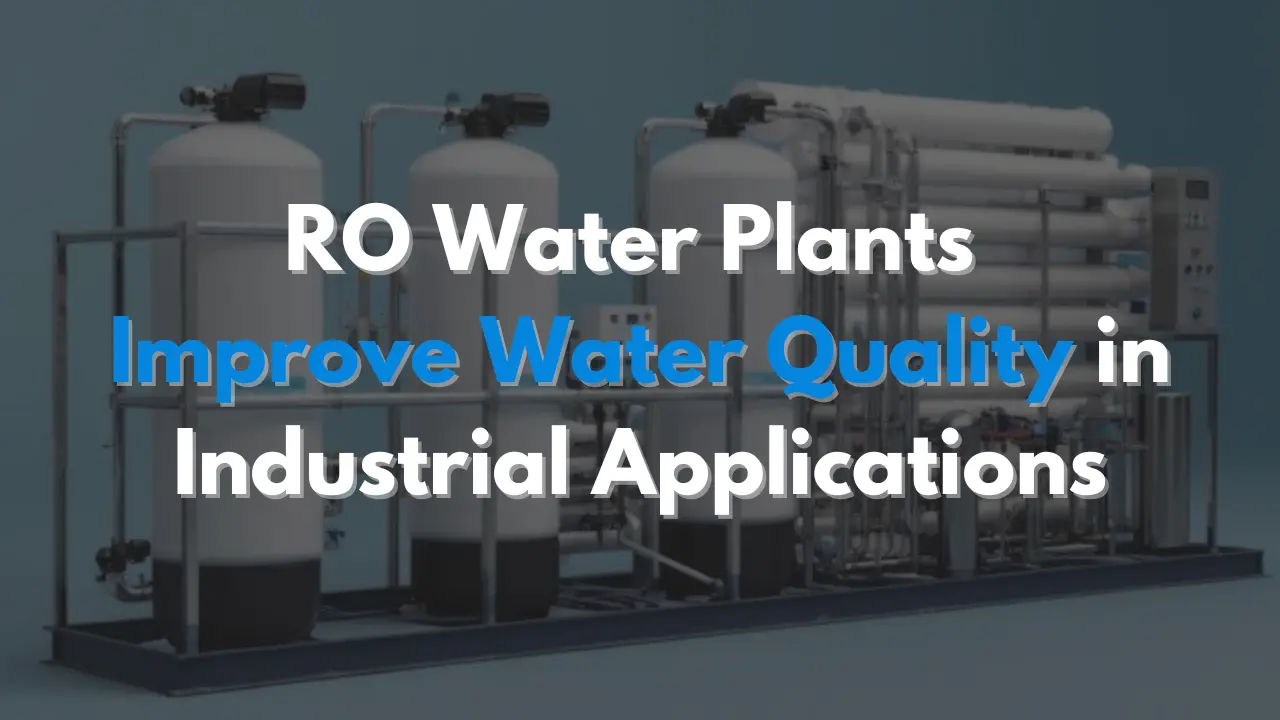
How RO Water Plants Improve Water Quality in Industrial Applications
Water quality is crucial in industrial applications. Many industries rely on high-quality water for various processes, from manufacturing and cooling to cleaning and product formulation. The presence of impurities and contaminants in water can lead to inefficiencies, equipment damage, and product quality issues. This is where RO water plants come into play. Reverse osmosis (RO) plants are highly effective in improving water quality, ensuring that industrial operations run smoothly and efficiently. In this blog, we will explore how Reverse osmosis plants enhance water quality in industrial applications and why they are an essential investment for many businesses.
Understanding RO Water Plants
RO water plants utilize the process of reverse osmosis to purify water. Reverse osmosis is a filtration method that removes impurities from water by forcing it through a semipermeable membrane. The membrane allows water molecules to pass through while blocking contaminants such as salts, minerals, bacteria, and other impurities. This results in highly purified water that meets the stringent quality requirements of various industrial processes.
Benefits of RO Water Plants in Industrial Applications
1. Removal of Contaminants
The ability of a RO water plant to eliminate a variety of impurities from water is one of its main advantages. Water used in industrial settings frequently needs to be free of bacteria, organic compounds, heavy metals, and dissolved solids. These contaminants can be successfully eliminated by a RO system, producing highly pure water that satisfies industry requirements. This is particularly crucial in sectors where water quality directly affects product quality and safety, such as the pharmaceutical, food and beverage, and electronics manufacturing industries.
2. Protection of Equipment
Water contaminants have the potential to seriously harm industrial machinery. Minerals and salts, for example, can cause scale accumulation in cooling towers, heat exchangers, and boilers, which lowers their performance and raises maintenance costs. Wear and tear on pipelines and machinery can also be caused by corrosive substances.
By using an RO water plant, industries can protect their equipment from the harmful effects of contaminated water, extending the lifespan of their assets and reducing downtime.
3. Improved Process Efficiency
High-quality water is essential for optimizing industrial processes. In many industries, water is used as a solvent, coolant, or ingredient. Impurities in water can interfere with chemical reactions, reduce heat transfer efficiency, and affect the consistency and quality of the final product.
An RO plant ensures that the water used in industrial processes is free from contaminants, enhancing process efficiency and product quality. For example, in the industries of food and beverage, purified water is used for maintaining the taste and safety of products.
4. Compliance with Regulations
Many industries are subjected to strict regulations regarding the quality of water quality to ensure environmental protection and public health. Failing to meet these regulations can result in hefty fines, legal liabilities, and damage to a company's reputation. An RO water plant helps industries comply with regulatory requirements by providing water that meets or exceeds the standards set by regulatory bodies. This is very important in industries like pharmaceuticals and food production, where the quality of water quality is monitored closely.
5. Cost Savings
While the initial investment in an RO plant can be significant, the long-term cost savings are substantial. By providing high-quality water, RO plants reduce the need for chemical treatments, maintenance, and repairs. They also help in minimizing the risk of failures of costly equipment and downtime in productions.
Additionally, improved process efficiency and product quality can lead to higher yields and reduced waste, further enhancing profitability.
6. Environmental Benefits
Using an RO water plant can also have positive environmental impacts. By removing contaminants from water, RO plants reduce the need for harmful chemicals and additives that can pollute the environment.
Moreover, many RO plants are designed to be energy-efficient, minimizing their carbon footprint. Industries can also implement water recycling and reuse strategies with the help of RO plants, conserving valuable water resources and promoting sustainability.
Applications of RO Water Plants in Different Industries
1. Pharmaceutical Industry
In the pharmaceutical industry, water purity is important for manufacturing medications, cleaning equipment, and preparing solutions. Contaminated water can compromise the safety and efficacy of pharmaceutical products. An RO plant provides the high-purity water required for these applications, ensuring that pharmaceutical products meet strict quality standards and regulatory requirements.
2. Food and Beverage Industry
The food and beverage industry relies heavily on high-quality water for various processes, including ingredient mixing, cleaning, and packaging. Impurities in water can affect the taste, safety, and shelf life of food and beverage products. An RO water plant ensures that the water used in production is free from contaminants, enhancing product quality and safety.
3. Electronics Manufacturing
In the industries of electronics manufacturing, even trace amounts of contaminants can cause defects in products like semiconductors and circuit boards. High-purity water is essential for cleaning and rinsing components to prevent contamination. An RO plant provides the ultra-pure water needed for these critical processes, ensuring the reliability and performance of electronic products.
4. Power Generation
Power plants require large volumes of high-quality water for cooling and steam generation. Contaminants in water can cause scale buildup, corrosion, and other issues that reduce the efficiency and lifespan of power generation equipment. An RO water plant helps power plants maintain optimal performance by providing purified water that meets the stringent quality requirements of the industry.
5. Chemical Industry
The chemical industry uses water in various processes, including chemical reactions, cooling, and cleaning. Impurities in water can interfere with chemical reactions and affect the quality of chemical products. An RO plant ensures that the water used in chemical processes is free from contaminants, improving process efficiency and product quality.
Conclusion
Investing in an RO water plant is a smart decision for industries that require high-quality water for their operations. RO plants offer numerous benefits, including the removal of contaminants, protection of equipment, improved process efficiency, compliance with regulations, cost savings, and environmental benefits. By providing purified water, RO plants help industries optimize their processes, enhance product quality, and achieve sustainable growth.

